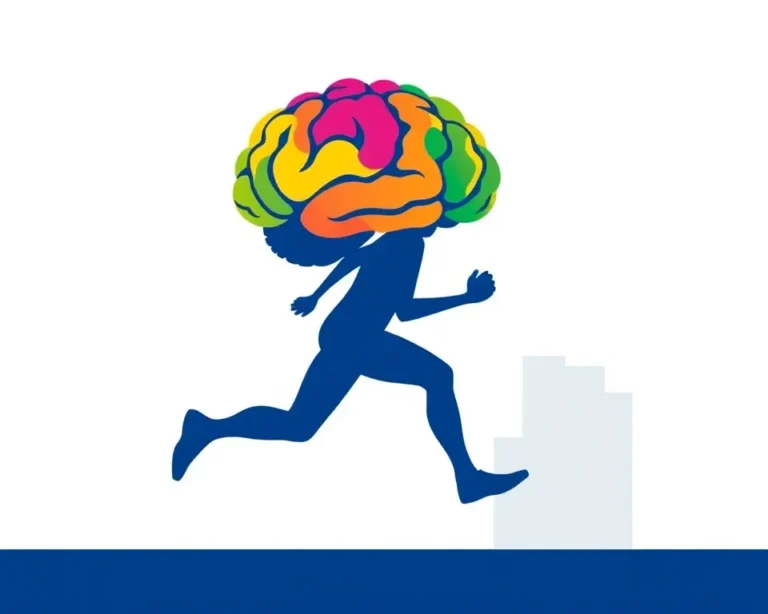New research continues to underscore the profound connection between physical activity and brain health. Findings presented at the American Academy of Neurology’s annual meeting highlight how moderate to vigorous exercise can significantly reduce the risk of dementia, stroke, anxiety, depression, and sleep disorders.
The Multifaceted Benefits of Exercise on Brain Health
The benefits of physical activity extend far beyond physical fitness, deeply impacting various aspects of cognitive function and mental well-being. Experts suggest that regular exercise acts as a catalyst for positive changes in the brain.
Enhanced Cognitive Function
Exercise has been proven to improve cognitive functions such as memory and concentration. Physical activity supports the systems that supply oxygen and glucose to the brain, both of which are vital for optimal function. This increased blood flow delivers essential nutrients to brain cells, fostering better communication and overall performance.
Reduced Risk of Neurodegenerative Diseases
One of the most significant findings is the potential of exercise to reduce the risk of dementia and stroke. By promoting better cardiovascular health and reducing inflammation, regular physical activity helps maintain the structural integrity of the brain and protects against age-related decline.
Improved Mental Well-being
Mental health benefits significantly from regular exercise. Studies have consistently shown that physical activity can alleviate symptoms of anxiety and depression. Exercise triggers the release of neurotransmitters like dopamine and serotonin, which are known to enhance mood and promote a sense of well-being.
Better Sleep Patterns
Sleep disorders often exacerbate mental and cognitive health issues. Regular exercise can improve sleep quality, making it easier to fall asleep and stay asleep. Better sleep, in turn, supports cognitive functions such as memory consolidation and emotional regulation.
How Exercise Changes the Brain
The impact of exercise on the brain is multifaceted, involving several key mechanisms that promote brain health and resilience.
Increased Blood Flow and Neurogenesis
Aerobic exercises, like running, increase blood flow to the brain. This heightened circulation delivers more oxygen and nutrients, which are crucial for the health and function of brain cells. Furthermore, some research indicates that exercise can stimulate neurogenesis, the creation of new brain cells, particularly in the hippocampus, the brain’s memory center.
Influence on the Hypothalamic-Pituitary-Adrenal (HPA) Axis
Exercise influences the hypothalamic-pituitary-adrenal (HPA) axis, which is central to the body’s response to stress. By modulating the HPA axis, exercise can reduce physiological reactivity to stress, helping individuals manage anxiety and improve their overall mood. This modulation is mediated by communication between the HPA axis and brain regions like the limbic system, amygdala, and hippocampus, all of which play critical roles in mood, motivation, fear response, and memory formation.
Psychological Benefits
Beyond the physiological changes, exercise offers significant psychological benefits. It provides a sense of accomplishment and self-efficacy, which can boost self-esteem and confidence. Engaging in physical activity can also serve as a distraction from negative thoughts and stressors, offering a mental break and a chance to reset.
Types of Exercise for Optimal Brain Health
While any form of physical activity is beneficial, certain types of exercise may offer specific advantages for brain health.
Aerobic Exercise
Aerobic exercises, such as running, swimming, cycling, and dancing, are particularly effective for improving cardiovascular health and increasing blood flow to the brain. These activities elevate heart rate and oxygen intake, promoting overall brain function and reducing the risk of cognitive decline.
Strength Training
Strength training is crucial for building and maintaining muscle mass, which is essential for overall physical health. It also has indirect benefits for brain health, such as improving metabolism and reducing inflammation. Combining strength training with aerobic exercise provides a well-rounded approach to physical and cognitive well-being.
Mind-Body Exercises
Mind-body exercises, such as yoga and Tai Chi, combine physical movement with mindfulness and relaxation techniques. These practices can reduce stress, improve focus, and enhance overall mental well-being. The combination of physical activity and mental focus can have a synergistic effect on brain health.
Integrating Exercise into Daily Life
Making exercise a regular part of daily life is crucial for reaping its benefits. Here are some practical tips for incorporating more physical activity into your routine:
Set Realistic Goals
Start with small, achievable goals and gradually increase the intensity and duration of your workouts. Aim for at least 150 minutes of moderate-intensity or 75 minutes of vigorous-intensity aerobic exercise per week, as recommended by health organizations.
Find Activities You Enjoy
Choose activities that you find enjoyable and that fit your lifestyle. Whether it’s dancing, hiking, swimming, or team sports, finding something you love will make it easier to stick with your exercise routine.
Make it a Habit
Schedule exercise into your daily or weekly routine and treat it as an important appointment. Consistency is key to experiencing the long-term benefits of exercise.
Incorporate Movement into Your Day
Look for opportunities to incorporate more movement into your daily routine. Take the stairs instead of the elevator, walk or bike to work or errands, and take short breaks to stretch or walk around during the day.
Seek Social Support
Exercise with friends or family members to stay motivated and accountable. Joining a fitness class or sports team can also provide social support and make exercise more enjoyable.
The Role of Mental Health Professionals
Mental health professionals play a vital role in promoting the importance of exercise for overall well-being. They can educate patients about the benefits of physical activity, help them set realistic goals, and provide support and encouragement.
Integrating Exercise into Treatment Plans
Exercise should be considered an essential component of treatment plans for individuals with mental health conditions. Mental health professionals can work with patients to develop exercise routines that are tailored to their individual needs and preferences.
Addressing Barriers to Exercise
Many individuals face barriers to exercise, such as lack of time, motivation, or access to facilities. Mental health professionals can help patients identify and address these barriers, providing practical strategies and support to overcome them.
Promoting Lifestyle Changes
Encouraging lifestyle changes that focus on the accumulation and increase of moderate-intensity activity throughout the day may be the most appropriate approach for many patients. This can include activities such as walking, gardening, and dancing.
The Future of Exercise and Brain Health Research
Ongoing research continues to explore the complex relationship between exercise and brain health. Future studies will likely focus on:
Understanding the Mechanisms
Further research is needed to fully understand the mechanisms by which exercise impacts the brain. This includes investigating the role of specific neurotransmitters, growth factors, and other molecules that mediate the effects of physical activity.
Personalized Exercise Prescriptions
Developing personalized exercise prescriptions based on individual characteristics, such as age, fitness level, and genetic factors, could optimize the benefits of exercise for brain health.
The Impact of Different Types of Exercise
Comparing the effects of different types of exercise on brain health could help identify the most effective strategies for improving cognitive function and mental well-being.
Conclusion
The evidence is clear: Exercise is a powerful tool for enhancing mental acuity and brain health. By incorporating regular physical activity into our lives, we can improve cognitive function, reduce the risk of neurodegenerative diseases, enhance mental well-being, and promote better sleep. Whether it’s a brisk walk, a challenging workout, or a relaxing yoga session, every movement counts towards a healthier brain and a happier life.







